
Related
Guests
- Gillian Slovonovelist, playwright and director of Grenfell: In the Words of Survivors.
- Ed Daffarnsurvivor of the 2017 Grenfell Tower apartment fire in London.
The play Grenfell: In the Words of Survivors, which is being staged this week in Brooklyn, tells the story of the 2017 apartment fire at Grenfell Tower in London that killed 72 people. It was the worst fire in Britain since World War II, and survivors blamed the government for mismanaging the public housing block and neglecting maintenance. The play tells the story of how the residents of Grenfell Tower, from the Caribbean, Portugal, Syria, Morocco, Ethiopia and Britain, created a thriving community even as their homes fell into disrepair in the years before the fire. Playwright Gillian Slovo says she was moved to create the play after watching “in absolute horror as that building burned,” wondering how such a tragedy could happen in one of the richest neighborhoods of London. We also hear from Grenfell survivor Ed Daffarn, who barely escaped the inferno with his life. “I’m here. It’s like a million-to-one chance,” Daffarn says.
Transcript
AMY GOODMAN: I also spoke to Gillian Slovo this week about her new play, which runs through Sunday in Brooklyn, New York, at St. Ann’s Warehouse. It recalls how in 2017 a devastating apartment fire in London’s Grenfell Tower killed 72 residents. It was the worst fire in Britain since World War II. Survivors marched to the British Parliament to protest the government’s handling of the disaster.
The story of the residents, from the Caribbean, Portugal, Syria, Morocco, Ethiopia, Britain, and how they created a thriving community as their public housing fell into disrepair from mismanagement in the years before the fire is told in the play Grenfell: In the Words of Survivors. It draws on interviews with residents at the heart of the fire, has been called a “riveting call-to-action” to finish the investigation into the catastrophe. This is the trailer.
TURUFAT YILMA: [played by Nahel Tzegai] It was a normal day and a normal evening.
RABIA YAHYA: [played by Houda Echouafni] I wasn’t feeling well, because I was pregnant.
MAHER KHOUDAIR: [played by Gaz Choudhry] We were about to celebrate our 27th wedding anniversary, my wife and I, on the 15th of June. We decided to invite some of our friends from the building.
ANTONIO RONCOLATO: [played by Joe Alessi] It was a nice, warm evening, I remember. Around 9:00, 10:00, I went to bed.
DISPATCHER: Fire Brigade.
CALLER: Hello, hi. The fire is flat 16, Grenfell Tower.
DISPATCHER: Sorry. A fire where?
EDWARD DAFFARN: [played by Michael Shaeffer] I’m lying in bed. I heard my neighbor’s smoke alarm going “bap, bap, bap.” I didn’t even bother getting out of bed.
UNIDENTIFIED: Between 1:20 and 2:00-ish, all hell broke loose.
NICK BURTON: [played by Ash Hunter] So I started screaming, “Where’s my wife? Where is my wife?”
RABIA YAHYA: The kids were literally trying to push the door shut.
UNIDENTIFIED: The combustible insulation, wasn’t it?
UNIDENTIFIED: To save costs.
ANDREW ROE: Absolute building system failure.
UNIDENTIFIED: One, two, three, four.
DAVID CAMERON: One of the key aims of this coalition is to massively reduce rules, laws and regulations.
EDWARD DAFFARN: To predict something is going to happen and have it happen and not be able to stop it, there’s no words for that.
AMY GOODMAN: The trailer for the play Grenfell: In the Words of Survivors, comes as the Grenfell Tower Inquiry’s final report into the disaster has been delayed for the third time. That last voice was the words of Ed Daffarn, a survivor of the Grenfell Tower fire, who’s portrayed in the play. Also Gillian Slovo, the South African-born novelist and playwright behind the play. I began by asking Gillian what prompted her to take on the topic.
GILLIAN SLOVO: Because I, like many people in Britain and possibly all over the world, watched in absolute horror as that building burned and asked myself the question: How is it possible that this can happen in this capital city of one of the richest countries in the world, in certainly one of the richest boroughs in that city, as well?
And I realized that the only way that one could talk about this in the theater was by using the real people’s words. They had had their words taken away from them. They had people speaking for them. And their voices were so powerful that I began to investigate whether people would be prepared to talk to me for the play. And actually, Ed was one of the first people I met, who I asked if he would talk to us.
AMY GOODMAN: And, Ed, talk about what you were doing at the time of the fire, how you became aware of it.
EDWARD DAFFARN: So, Amy, it was a beautiful, beautiful, warm, hot day in London. We were in the middle of Ramadan. People were enjoying — you know, enjoying just a normal, everyday, everyday existence. And then, that evening, I went to bed. I went to bed about half past 12:00, 1:00. And a few minutes later, I heard my neighbor’s smoke alarm going off, a kind of ping, ping, ping sound. And to be honest with you, I was so unconcerned that I didn’t even get out of bed. I just assumed that my neighbor had burned something in the kitchen and set his smoke alarm off.
But a couple of minutes later, there was kind of some commotion out in the communal hallway. And at like 1:15 at night, that was very unusual. So I hopped out of bed, put on a pair of shorts, went to my front door, opened my front door, expecting to see my neighbor there, you know, apologizing for burning something in his kitchen. But instead of that happening, as I opened my front door, I was confronted by this wave of black smoke. And my heart just dropped. I just couldn’t believe it. You know, this wasn’t a minor incident. This was like something obviously very serious.
And my first instinct was to stay where I was, because our landlord had instructed us to stay put in the building if there was a fire. But literally two seconds later, my phone rang, and it was a neighbor of mine from downstairs who had already exited the building. And he shouted at me. He said to me, “Get out! Get out of the building!” And he said it in such a forceful way, so powerfully, that I didn’t argue with him. So, I went to my bathroom. I wetted a towel. I put a towel around my mouth. And then I exited out into the communal hallway, needing to find the emergency stairwell, which was about — probably about five meters diagonally.
But it was so smoky that I couldn’t see beyond the end of my nose. And in attempting to find my way to the emergency exit, I actually hit the wall to the left-hand side of the door. And instead of figuring out I needed to move, I started panicking, and I let go of my towel, and then I started inhaling the smoke. And then I was literally thinking to myself, “I’m not going to get out of this. I’m going to — you know, this is it,” when at that moment a firefighter, who had come through the door, which I was very close to, tapped me on my leg and got up and then grabbed hold of me. And then him and his fellow firefighter dragged me out into the communal hallway. And then I just ran for — after getting myself together, I just ran for my life downstairs. So, I’m here as sort of like a million-to-one chance, really.
AMY GOODMAN: I want to go to a clip right now of another of the residents, Rabia Yahya. She is played by Houda Echouafni in the play Grenfell: In the Words of the Survivors.
RABIA YAHYA: [played by Houda Echouafni] So, then, my neighbor, she’s a mom. She said, “OK, we’ll go together.” So she tried to get some towels to wet for her boys, and I went to help her to wet them. But there was no water pressure. It was literally dripping. And we had to wait ages just to wet the towels. We wet them, and then we pushed the door open. And I picked up my little one, picked her up on my chest. She was 3 at the time. And I remember holding onto my kids, both hands. And she was called “Monkey,” because she was always like a — like a little monkey. She just clings on. She clung onto me. We couldn’t — you couldn’t see nothing. It was pitch black.
AMY GOODMAN: And then there’s Maher Khoudair, who’s played by Gaz Choudhry. He was a Syrian refugee, had come to Britain, had his family there in Grenfell. He used crutches. Forty percent of those who died in the fire were disabled. He talks about what happened.
MAHER KHOUDAIR: [played by Gaz Choudhry] My eldest daughter knocked on our bedroom door. She knocked. She said, “Dad, there’s a fire.” She said they were going to go downstairs. I said, “No, wait here.” I opened the front door and realized there was smoke coming up, black. I closed the door and said, “Clearly, there’s something going on — a fire in a room or a flat. Just stay here.” My eldest said, “No, we need to go downstairs.” My youngest said, “Touch the wall, Dad. It’s like fire,” the wall next to their bed in the living room. I said, “You go downstairs, all of you.” My wife refused, saying that with my condition, I needed help. I said, “No, the kids are here. Go downstairs, because you’ll get down fast. But I’m slow. Go. If they lose me, at least they’ll have you.” I made my wife and daughters leave first, because I move slowly.
AMY GOODMAN: Gillian Slovo, one of the horrors in this play, that’s repeated over and over by the different survivors, was the “stay put” order and how seriously people were taken when they called the authorities, the equivalent of 911 in the United States, those that had accents, for example, and what they were told. Can you tell us some of those stories of the people that you profile, that you animate their words?
GILLIAN SLOVO: I mean, the problem was, in Grenfell, because of the cladding, the fire went up that building within 20 minutes. It went up right to the top of that building. But the people who answered the 911 — what we call 999 — calls were in a separate office. They had no access to seeing the pictures of where the fire had gone. And as a result, when people rung up and said, “There’s smoke in my building,” “There’s fire outside my window, “It’s coming into my neighbor’s,” they were told, “No, it’s on the fourth floor. Don’t worry. Stay put,” because that was the orthodoxy, that buildings were supposed to be built in a way that if there was a fire not on your floor and not near your floor, you should be safe enough to stay inside.
I think what is amazing about listening to some of the evidence that was given is that the firefighters were, in a way, blinkered. They saw what was happening from outside, but they didn’t really know what to do, whereas people from the area who were watching were shouting, “Get out!” That’s one of the reasons that Ed got out. He didn’t phone 911. He actually was phoned by a friend, who told him, in the right voice, “Get out of that building.” There were, however, people who did phone 911 and were told, “Stay put. We will come and get you,” and were disbelieved. And there is some evidence from the calls that the better you spoke English, the more that the operators would listen to what you were saying, that if your English was in any way faulty or you had an accent, they just wouldn’t believe what you were saying. In fact, those people in the flats were right, and what the firefighters were saying was wrong.
AMY GOODMAN: So, where are the survivors today? And where is the inquiry today?
EDWARD DAFFARN: So, I mean, I think most of the survivors — I can’t speak for everyone who have been rehomed — the focus now very much has — you know, basically, in the immediate aftermath of the fire, we really just needed like a very humanitarian response. We just needed to kind of come together, have some time, have some space, to kind of come to terms with that sort of trauma. And then, I think, the following year, we were much more focused on the practicalities about kind of where people were living, you know, how people’s mental health issues were going to be addressed.
And as time has moved on, the focus now is much more around three things: truth, justice and change. And truth will hopefully come out, finally, when the public inquiry report is published, although we don’t have a date for that. Justice is very difficult. There has still not been a single arrest for the perpetrators of the fire at Grenfell Tower that killed 72 people. But as survivors and bereaved, we are determined that we don’t want people to be treated the same way that we are, so we campaign for changes to the law around people who live in — about the way that people who live in social housing are treated.
It’s very frustrating. It’s very frustrating that almost seven years after Grenfell, some of the recommendations that were made in the first phase of the public inquiry have still not been enacted by the government. And, you know, we’re coming up now to the phase two and those recommendations. But there’s a — you know, there’s a mistrust of government in that if they can’t implement phase one recommendations, what faith will we have that they will be able to implement phase two recommendations?
AMY GOODMAN: Ed Daffarn, survivor, who’s portrayed in the play Grenfell: In the Words of Survivors, and playwright Gillian Slovo, South African-born. The play runs through Sunday, May 12th, at St. Ann’s Warehouse in Brooklyn, New York. It’s performed by London’s National Theatre. And this interesting fact: Today is the 30th anniversary of the inauguration of South African President Nelson Mandela. I’m Amy Goodman. Thanks so much for joining us.

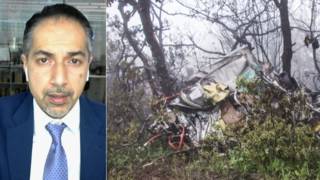
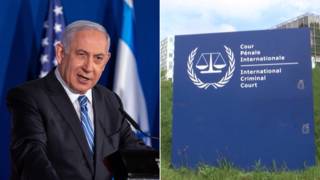
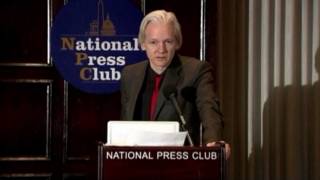
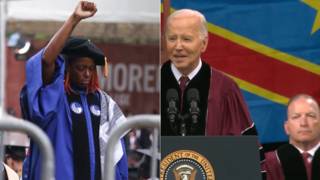
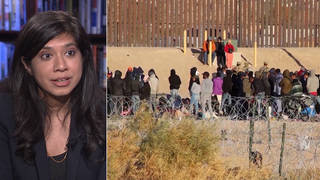




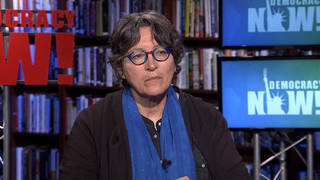
Media Options